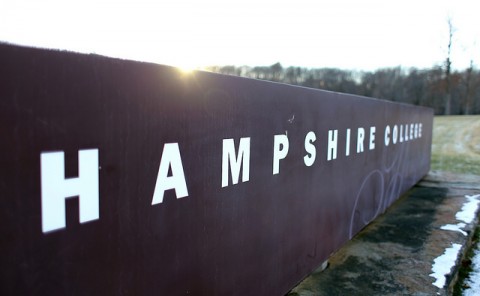Following several months of uncertainty, Hampshire College will remain an accredited institution, the New England Commission of Higher Education announced on Nov. 22.
According to a press release from NECHE, the Commission decided not withdraw Hampshire’s accreditation or place it on probation “due to substantial progress made” by the College since May of this year.
“The affirmation of Hampshire’s accreditation is an important milestone in our collective work to secure a thriving future for the College,” Hampshire President Ed Wingenbach said in a letter sent to the Hampshire community. “NECHE’s decision offers external validation of what we already know: that our community has the creativity and commitment to build a Hampshire College that is both financially sustainable and visionary.”
Accreditation works to “ensure that education provided by institutions of higher education meets acceptable levels of quality,” according to the U.S. Department of Education. NECHE acts as an accrediting body for institutions within New England and awards accreditation based on its Standards of Accreditation.
In May, the NECHE deferred its decision on Hampshire’s accreditation to November. Wingenbach said in a phone interview that NECHE asked for a report from Hampshire to show the college “had the resources to deliver a quality education.”
“This report was a detailed plan based on data and evidence showing that Hampshire College is both currently financially stable,” Wingenbach said, “and that we have a viable, conservative, doable plan to maintain financial sustainability over the course of the next five years and beyond.”
Hampshire will send a second report to NECHE in December of 2021 that demonstrates the College has reached certain milestones in its sustainability plan, and that it is making further progress on future goals.
“The work we did for the NECHE report is work we would have done whether we had been asked to report to NECHE or not,” Wingenbach said. “We spent much of the fall developing clear plans for our future and revising our academic programs.”
Hampshire’s accreditation came into question following the College’s announcement it would be seeking a long-term strategic partner in January due to financial concerns. The College enrolled 12 students for the fall 2018 semester but plans to accept a full class in the spring 2020 and fall 2020 semesters. The College has since announced it will not be seeking a partner anymore and will remain independent.
Hampshire is also planning to transform its education system. The new model will be “question-driven,” Wingenbach said, where Hampshire will help guide students to answer a particular question of interest, and students will design projects and use resources available from the College or the Five College Consortium to answer such questions. According to Wingenbach, the new model will help students develop skills in entrepreneurship and project management.
“Our faculty right now is working on reorganizing themselves around those large questions and challenges that face contemporary society,” Wingenbach said, “which will allow us to offer seminars and programs that are particularly relevant to contemporary students and their interests in multiple divisions and multiple fields.”
The new model will be implemented for the class of 2024 as it is further developed over the next four years. Students currently enrolled will follow the older model, but will be able to take seminars that are a part of the new education program.
Wingenbach also said Hampshire plans to raise $60 million in operational support by 2024, with the College already raising $10.7 million since January. Most of the money will come from individual donors, such as alumni or parents of students.
Ken Burns, a prominent documentarian and a 1975 alumnus of Hampshire, will serve as a co-chair of the College’s fundraising campaign. Burns helped kick start fundraising for Hampshire in May by asking his fellow alumni to support the College.
“I am steadfastly devoted to [Hampshire’s] model, to its experimenting nature, even to this crisis as an opportunity to reinvigorate what I think we do better than anyone else,” Burns said in an interview with WBUR in May.
When asked if he felt Hampshire was in a different state than it was at the beginning of the year, Wingenbach said the College is in a “very different situation.
“We are currently stable, we have no doubt we can raise the funds and attract the students we need to maintain that stability, and we are absolute committed to being an independent private college.”
To Wingenbach, remaining independent is “non-negotiable.”
“We can’t maintain our distinct mission and model of education unless we are an independent college,” he said.
Will Mallas can be reached at [email protected] and followed on Twitter @willmallas.




















